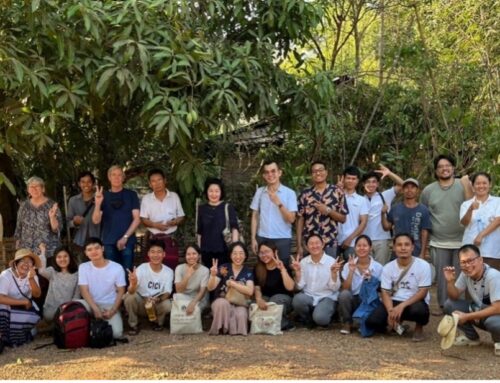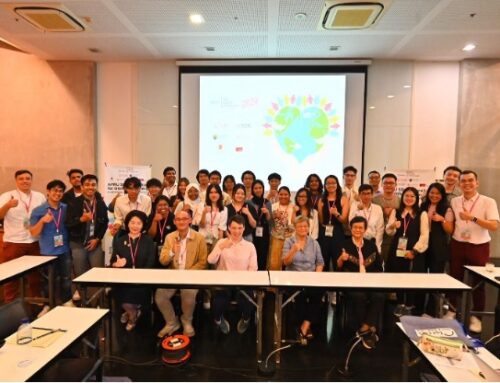A documentary film “Ghost Fleet”

We invite all honorable and interested parties. Watch a documentary film “Ghost Fleet”
Across the Three Oceans:
A thousand-mile journey to save enslaved fishermen
Across the Three Oceans is a report produced by the Labour Protection Network (LPN) that provides an overview of the work that they do to tackle human trafficking and forced labour in the sea fishing industry of Thailand, particularly in relation to migrant workers.
This is where the documentary film “GHOST FLEET” comes in.
To be screened for the 2nd time on Monday, April 3, 2023.
1st round at 12.00 pm and 2nd round at 16.00 pm.
At the Foreign Correspondents’ Association of Thailand (FCCT)
Maneeya Center, P Floor, Bangkok
Organized by FCCT in collaboration with Labour Protection Network (LPN) and Urban Action Samutsakhon : UAS
The film “Ghost Fleet” https://www.youtube.com/watch?v=1bcwNekGIAI directed by Shannon Service and Jeffrey Waldron and produced by Vulcan Production.
Contact us for more details at
Sompong Srakaew
Founder/ Executive Director
A: Labour Protection Network | 25/17-18 Mahachai Muangtong Village | Sahakorn Rd, Samutsakorn, Thailand 74000
M: +66-855-34-1595 , 096 095 7296| P: 034-434-726
Across the Three Oceans: a thousand-mile journey to save enslaved fishermen
Across the Three Oceans is a report produced by the Labour Protection Network (LPN) that provides an overview of the work that they do to tackle human trafficking and forced labour in the sea fishing industry of Thailand, particularly in relation to migrant workers.
This report opens with Pornpan Kanjanatiwat’s article “30 Years to Achieve Equal Protection of Workers in Sea-fishing Sectors”. This piece is focused on the relationship between Thailand’s sea-fishing industry and migrant workers, as well as the actions taken by the Thai Government in consideration of labour protection. Due to a significant disparity between the supply and demand of workers in the sea-fishing industry, sea-fishing operators turned towards the recruitment of foreign migrant workers, even those undocumented. The Thai Government enacted flexible policies to accommodate the influx of undocumented workers in order to ensure that the demand for labourers was met. These conditions allowed broker syndicates to coerce and force men into labour on fishing vessels where they were then effectively trapped. The sheer number of missing fishers raised alarm to the issue of human trafficking, inciting a search for Thai citizens who had vanished; however, the response from the Thai Government was ineffectual and slow. LPN has been key in bringing media and the public’s attention to this issue, and improvements surrounding the legal protection of labourers in the sea-fishing industry have occurred, but without funding and commitment from a broad selection of actors, this issue will persist.
The second article featured in this report, “Operations Saving Workers in Fishing Boats from Indonesia ”, is written by LPN’s co-founder, Patima Tungpuchayakul. Within this piece, Tungpuchayakul discusses LPN’s involvement with assisting fishermen stranded on islands in Indonesian waters. She describes the circumstances in which these men are manipulated and forced onto the fishing vessels and the following torturous and inhuman working and living conditions they must endure as forced labourers at sea. Subsequently, Tungpuchayakul provides background on how these fishermen came to be stranded in Indonesia after their enslavement– the crackdown by the Indonesian Government on illegal fishing in 2014 pushed the employers of these vessels to abandon the men on Indonesia islands. Consequently, LPN has made it their mission to find these victims and get them home.
Within this report, the summary of actions taken by LPN in assisting fishing workers from Indonesia between August 2014 and October 2016 is provided. A timeline of events is supplied to give an outline of the operations implemented by LPN throughout this time frame. The number of people assisted and the actions that LPN executed is provided in each case.
Repatriation is an important aspect of these operations. Hence, LPN outlines the process of the standard practices that their team takes to assist the fishers in returning home. This includes identifying the stranded fishers, contacting embassies, and informing family. The nationality of the labourers impacts the steps taken, thus the different processes taken to return migrant workers depending on their countries of origin is provided.
Within this report, the statistics of the people aided by LPN can also be found. This includes a breakdown of the type of assistance received, such as repatriation through LPN coordination or assistance in legal services, as well as their nationalities and from which island they were rescued. LPN has helped over 2,500 people.
The challenges that LPN faces in trying to assist the forced labourers can also be found in this report. Varying obstacles occur depending on the type of assistance given. Regarding the assistance to the repatriation of stranded fishing workers, difficulties faced by LPN include locating the fishermen and accessing the islands which cannot be directly reached from Jakarta. In the case of victim rescue operations, challenges lie with a lack of funding and resources, as well as a lack of engagement by the government and general society.
A summary report of a rescue operation that took place in Indonesia between the 26th of September and 12th of October in 2016 can also be found in this document. The objectives, the area of exploration, and the outcomes and findings are provided to give a broad overview of the operation. Brief information is given on the fishers found, as well as the barriers faced by LPN throughout the operation.
The final section of the report is focused on how to help the rescued workers once they have returned home. LPN has provided data detailing the number of migrant workers returned to their country of origin, as well as the coordinating agencies who assisted in the process along with LPN. Recommendations for helping returned victims are also provided.
Visarut Sankham discusses in his article, “Shelter, Career and Network”, the work LPN does in rehabilitating and assisting the victims in order to return to normal life. The Training and Rehab Center for Thai and Migrant Labour is a project started by LPN in 2017. It aims to improve the mental sadness of migrant workers that have lost their human dignity and sense of self-worth through rehabilitation of mind and body. Moreover, to facilitate the assimilation of the victims back into society the center provides food, refuge, access to professional therapists specialising in rehabilitation, and occupational training to victims.
LPN also provides an outline of the steps that must be taken in order to achieve their goal of changing the sea-fishing industry in terms of preventing human trafficking and forced labour. This includes spreading awareness, changing policy, and encouraging regional and global collaboration.
Four letters from rescued victims can also be found detailing their personal experiences and the uncertainties and struggles they faced as trafficked victims. These letters provide the reader a personal, inside report, highlighting the issues of the sea-food industry and forced labour.
Finally, the report concludes with a profile of LPN which highlights their history, vision, goals, and the awards they have received for their work. A model of their organization is also provided as well as their aims for educating migrant children. The work that they do to improve labour conditions at the local, national, and international level can also be found.



